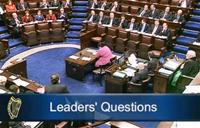Irish elections' results promise a renegotiation of the bailout loan's interest rate
Ralitsa Kovacheva, February 28, 2011
 Expectedly, Fine Gael won the Irish elections on 25 February, but failed to win an absolute majority in Parliament (the Dáil). At this stage of the vote counting, Fine Gael is having 70 seats (19 more than in the previous Parliament), the Labour Party - 36 (9 more seats), Fianna Fail - 18 (59 seats less), Sinn Fein - 13 (9 more). The United Left Alliance will be presented in Parliament for the first time ever with 5 deputies. The Green Party failed to enter the Dáil, although it has left the coalition with Fianna Fail to protest against the policy of the ruling party. The turnout was slightly above 70% which is the highest level since 1987.
Expectedly, Fine Gael won the Irish elections on 25 February, but failed to win an absolute majority in Parliament (the Dáil). At this stage of the vote counting, Fine Gael is having 70 seats (19 more than in the previous Parliament), the Labour Party - 36 (9 more seats), Fianna Fail - 18 (59 seats less), Sinn Fein - 13 (9 more). The United Left Alliance will be presented in Parliament for the first time ever with 5 deputies. The Green Party failed to enter the Dáil, although it has left the coalition with Fianna Fail to protest against the policy of the ruling party. The turnout was slightly above 70% which is the highest level since 1987.
It is expected as early as Monday Fine Gael's leader and most likely the future Prime Minister Enda Kenny to start negotiations with the Labour party on the formation of a coalition government. Some analysts say, however, that combinations with the independent representatives are also possible. The government must be formed until the first meeting of the new Parliament on 9 March and foremost- before the Euro Area Summit on 11 March.
The main pre-election promise of Fine Gael and the Labour was that, in case of a victory, they would renegotiate the terms of the rescue loan from the EU and the IMF. In particular, the part that amounts to 17.7 billion euro of the total loan, which comes from the rescue fund for the euro area (EFSF) at an interest rate of around 6%. According to both parties and also according to many analysts, the interest rate is too high and must be renegotiated.
The center-right Fine Gael has good political chances to achieve this goal - it is a member of the European People's Party, like the President of the European Commission Jose Manuel Barroso, the President of the European Council Herman Van Rompuy, the German Chancellor Angela Merkel. Germany has the decisive word on this issue, because the country has the biggest contribution to the euro area rescue fund as in the form of guarantees, as well as with its triple A credit rating.
The issue of the Irish interest rate, however is tied to the issue of prolonging the maturity of the Greek bailout loan, the change of the lending capacity and the scope of activities of the current provisional rescue fund (EFSF), as well as the definition of the future European Stability Mechanism (ESM). All these issues, as well as the Pact for competitiveness, proposed by Germany and France will be discussed at the Euro Area Summit on 11 March and then at the European Council on 24-25 March.
Meanwhile, the Brussels-based website EurActiv reported that the President of  the European Commission, Jose Manuel Barroso and the President of the European Council, Herman Van Rompuy, had dispersed their own version of the Pact for competitiveness. According to sources of the medium it was “substantially more flexible” than the proposal of Ms Merkel and Mr Sarkozy. Berlin and Paris insisted the euro area Member States to fulfill 6 conditions to regain their competitiveness in order to be allowed to ask financial assistance from the bailout fund.
the European Commission, Jose Manuel Barroso and the President of the European Council, Herman Van Rompuy, had dispersed their own version of the Pact for competitiveness. According to sources of the medium it was “substantially more flexible” than the proposal of Ms Merkel and Mr Sarkozy. Berlin and Paris insisted the euro area Member States to fulfill 6 conditions to regain their competitiveness in order to be allowed to ask financial assistance from the bailout fund.
The Pact is still not officially published but according to media reports, these 6 conditions are: to abolish wage indexation to inflation, to ensure mutual recognition of diplomas and professional qualifications, to establish a common basis for corporate taxation, to link pension schemes to demographic development, to introduce constitutionally-bound debt brakes and to establish national frameworks for crisis management in the banking sector.
According to the EurActiv, the proposal of the two EU chiefs is also binding the loans from the European Financial Stability Facility with some measures related to salaries, pension ages and corporate tax, but it is more about “guidelines” than about stringent requirements. For instance, there is no such point as in the Franco-German proposal Member States to abolish the wage indexation, which provoked acute criticism in some countries. EurActiv noted that “Belgium, Cyprus, Luxembourg and Malta all use indexation to set some domestic wages, while others - including Portugal - relate salaries to price growth through collective bargaining agreements and negotiations.”
Medium's sources say that Barroso-Van Rompuy's plan will follow the EU's Annual Growth Survey published in January. Both leaders do not approve the Franco-German “one-size-fits-all approach”, European officials commented. Both countries, however, pointed that the only way for the euro area to regain competitiveness was the yardstick to be the member state that showed best practice (in Angela Merkel's words). Given that Germany is the best performer in many of the areas, treated by the Pact, the opponents of the idea consider that it will lead to a “German Europe”. However, we have not heard yet why this should be that bad.
 Klaus Regling | © Council of the EU
Klaus Regling | © Council of the EU Mario Centeno | © Council of the EU
Mario Centeno | © Council of the EU Mario Centeno | © Council of the EU
Mario Centeno | © Council of the EU Angela Merkel, Emmanuel Macron | © Council of the EU
Angela Merkel, Emmanuel Macron | © Council of the EU Benoit Coeure | © Council of the EU
Benoit Coeure | © Council of the EU Pierre Moscovici | © Council of the EU
Pierre Moscovici | © Council of the EU